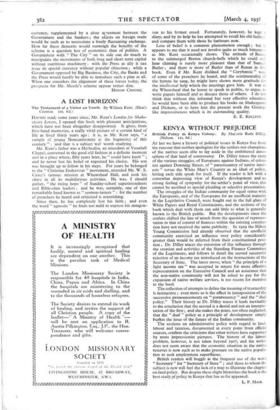A LOST HORIZON The Testament of a Victor.an Youth. By
William Kent. (Heath Cranton. tos. 6d.) HAVING read, some years since, Mr. Kent's London for Shake- speare Lovers, I opened this book with pleasant anticipations, which have not been altogether disappointed. It gives, from first-hand memories, a really vivid picture of a certain kind of life as lived thirty years ago ; it is, as Mr. Kent says, " a sample of young Nonconformity at the beginning of this century " ; and that is a subject wel' worth studying.
Mr. Kent's father was a Methodist, an attendant at Vauxhall Chapel, converted iii the good old fashion at a definite moment and in a place where, fifty years later, he " could have knelt " ; and he never lost his belief or regretted his choice. His son was brought up to follow in his steps. For years he belonged to the " Christian Endeavour " movement, attended Mr. W. S. Caine's famous mission at Wheatsheaf Hall, and took his share in all its multifarious activities. He was, I should gather, " the rising hope " of Sunday-school superintendents and Bible-class leaders ; and he was, certainly, one of that remarkable band known as " sermonitasters " : for the number of preachers he heard and criticised is astonishing.
Since then, he has completely lost his faith ; and even the word " agnostic " he finds too mild to express his antagon-
ism to his former creed. Fortunately, however, he kept diary, and by its help he has attempted to recall his old feelin and compare them with those he- harbours now.
Loss of belief is a common phenomenon enough ; but appears to me that it need not involve quite so much bittern as Mr. Kent occasionally shows. The attitude of Rem, to the submerged Breton church-bells which he could still hear chiming is surely more pleasant than that of Samuel Butler ; and there is more of Butler than of Renan in thi.
book. Even if Mr. Kent disliked the " Corybantic " , of some of the preachers he heard, and the sentimentality o: the hymns he sang, he might have shown more gratitude for the intellectual help which the meetings gave him. It was- at the Wheatsheaf that he learnt to speak in public, to argue, to write papers himself and to discuSs those of others. I do not think that without this informal but very effective education he would have been able to produce his books on Shakespeare and Dickens, or to have lent the present work the Gissing- like impressiveness which is its outstanding quality.
E. E. KELLErr.






































































 Previous page
Previous page